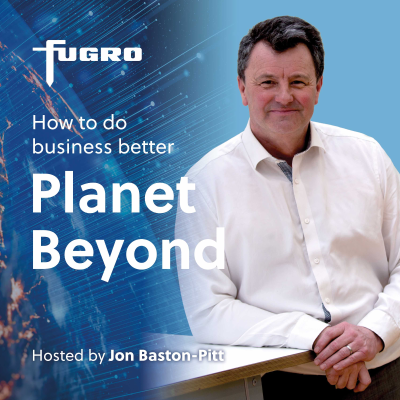
Planet Beyond
inglés
Tecnología y ciencia
Empieza 7 días de prueba
$99 / mes después de la prueba.Cancela cuando quieras.
- 20 horas de audiolibros al mes
- Podcasts solo en Podimo
- Podcast gratuitos
Acerca de Planet Beyond
Welcome to the Planet Beyond podcast. Brought to you by Fugro, the leading partner in uncovering geo-data from the greatest subsea depths right to outer space and hosted by Jon Baston-Pitt. Planet Beyond is about doing business better in our fast changing, and acutely delicate, yet exquisite, world. Together we will explore issues beyond the day-to-day challenges; listen to those who should be listened to; seek out what needs to be done and get aligned around the new tomorrow our children deserve and that we have a responsibility to deliver.
Todos los episodios
97 episodiosEpisode 50: Mangroves, Drones, and Data
In a few week’s time the 30th UN Climate Change Conference will take place in Belém, Brazil. While the world is making progress on cutting the carbon emissions that cause climate change, there is much work still to be done. Even if the world were to meet the goals put in place ten years ago in the Paris Agreement, we would continue to face the impacts of climate change. We will also need to focus on adaptation. One adaptation that could both build resilience and absorb carbon dioxide emissions from the atmosphere is the development of mangrove forests. In this episode, first aired in February 2024, and focused on the outcomes of COP 28, Jon Baston-Pitt was joined by two guests who have been using cutting edge technology to plant new mangroves. Jane Glavan is the co-founder of Distant Imagery. The company combines cutting edge technologies with locally available techniques and materials, to develop drones, balloons and kites that can be used to bring us closer to Net Zero. In Abu Dhabi, their drones are reforesting mangrove swamps, propelling thousands of seedlings into the ground, in every eight minute drone flight. This is a long-term project. Mangroves can take decades to reach maturity. Distant Imagery needed more access to data to track, refine, and share their approach. That has been Fugro’s focus. David Millar shared the importance of the UN Ocean Decade Corporate Data Group, which we first looked at in a February 2023 shortcast [https://www.fugro.com/news/podcasts/louis-demargne-sharing-data-to-save-oceans-podcast-by-fugro]. The group is working to make available ocean data from some of the world’s most important private-sector collectors, and share it with potential users, such as Distant Imagery. Host Jon Baston-Pitt Guests Jane Glavan, Co-Founder, Distant Imagery [https://www.distantimagery.com/] David Millar, Government Accounts Director, Americas, Fugro
Episode 49: Adding Autonomy to ROVs
Artificial Intelligence is developing at a dizzying pace. One day soon, its proponents promise, it will revolutionise the way we work. The growth of AI could lead to the birth of ‘cobots’, robots able to collaborate safely with humans in shared spaces. But the development of machine autonomy and remote operations has much deeper roots. The goal of robotics has been described as replacing humans in roles that are dirty, dangerous, or dull. Offshore work can often meet all of these criteria. Bringing surveyors to offshore sites on a fossil fuelled vessel is, in carbon terms, dirty. These expert personnel will spend at least some part of the voyage on dull tasks, in between the work they are trained for. And any work offshore carries some level of danger that must be managed carefully. Fugro has developed remotely operated vehicles, or ROVs, that can be launched from uncrewed surface vessels. This eliminates dull and dangerous working offshore, and makes a move away from dirty carbon emissions possible. But remotely operated vehicles face challenges at sea. They must react quickly to changing conditions, and data transmission limits underwater restrict the ability of remote operators to respond in time. In this episode, first aired in March 2023, Jon Baston-Pitt is joined by Fugro’s Mark Bruce, and the National Robotarium’s Yvan Petillot. The conversation took place shortly after a first successful test of remotely operated systems, that will allow ROVs to work efficiently, responding to changes in their environment without human intervention. Host Jon Baston-Pitt Guests Yvan Petillot [https://researchportal.hw.ac.uk/en/persons/yvan-petillot], Professor of Robotics and Autonomous Systems, Heriot Watt University; joint academic lead, The National Robotarium. Mark Bruce, Product Owner, Next Generation ROVs, Fugro
Episode 48: Remote Operations in Commercial Space
Some time ago, in an office quite far away, Tim Crain, vice president of R&D at Intuitive Machines, joined Jon Baston-Pitt for an episode of Planet Beyond, alongside Fugro’s Dawn McIntosh and Sam Forbes. In that episode, first aired in November 2022, our guests discussed Intuitive Machine’s plans for the first commercial soft landing on the moon. The mission, which took place in February 2024 didn’t quite go to plan, but did successfully achieve a soft landing with all equipment functional. The work at Fugro’s Space Automation, Artificial Intelligence and Robotics Control Complex, or SpAARC continues. This January, 2025, Sam Forbes joined the Engineering Matters podcast [https://engineeringmatters.reby.media/2025/01/30/314-remote-operation-to-the-moon-and-back/], alongside guests from around the world, to trace the development of the Remote Operations Centres. Like the SpAARC, these purpose built facilities allow for control of equipment, without the risks and costs associated with working offshore, or in space. Commercial space activity remains at the top of many nations’ agendas. At the UK Space Conference this month, July 2025, the UK government highlighted the role that space will play in the economy, highlighting areas that will be part of the core focus of a new 10 year industrial strategy. Earlier this year, the European Space Agency reported that it had grown its ESA Investor Network to include 80 members, investing around €1bn in space-related activities. The commercial space sector doubled in size in the decade before this episode first aired. In this episode we are joined by one of the most promising commercial space contractors, and a new control centre based in Australia that will support this and future endeavours to the Moon and beyond. Host Jon Baston-Pitt Guests Tim Crain, Vice President, Intuitive Machines [https://www.intuitivemachines.com/] Dawn McIntosh, Space Systems Director, Fugro [https://www.fugro.com/about-fugro/our-expertise/remote-and-autonomous-solutions/spaarc] Sam Forbes, Director, SpAARC [https://www.fugro.com/about-fugro/our-expertise/remote-and-autonomous-solutions/spaarc], Fugro Introduced by Alex Conacher
Episode 47: Innovation in Offshore Wind Biodiversity
Over three episodes, we’ve been learning about ways to maintain, and even improve, biodiversity around offshore wind farms. We’ve heard how the industry is helping to shape biodiversity policy. We’ve talked to researchers who are developing ways to monitor the interactions of birds and turbines. And in this final episode, we’re going to discover innovative ways to monitor biodiversity across marine ecosystems more efficiently, and less invasively. Umberto Binetti is a marine biodiversity expert, working for developer RWE [https://www.rwe.com/en/]. He explains that current monitoring requirements focus on construction, when the most disruption is expected. Some wind turbines are now reaching the end of their design life, and face mandatory removal. This could see foundations that have become a biodiversity hotspot being dismantled, at great expense and risk to offshore workers, with a negative impact on marine life. RWE’s SeaMe [https://www.rwe.com/en/research-and-development/wind-power/seame-project/] project at the Kaskasi windfarm in Germany, supported by the German Alliance for Marine Research (DAM [http://allianz-meeresforschung.de/en]), is using a suite of innovative technologies, including drones, autonomous underwater vehicles, eDNA, and machine vision to provide holistic monitoring of wind farms. Fugro’s Dan Smith is working on the BeWild project [https://www.wur.nl/en/project/bewild-measuring-biodiversity-at-offshore-wind-farms.htm] at the CrossWind wind farm in the Danish North Sea, in collaboration with Wageningen University, Mecal [https://mecal.nl/], Seekable [https://www.seekable.nl/] and the Rich North Sea [https://www.therichnorthsea.com/]. The project uses Fugro’s uncrewed surface vessels and remotely operated vehicles, alongside other equipment, to collect high resolution images for three-dimensional photogrammetry, and eDNA. These innovations will help develop holistic ecosystem-wide monitoring, allow wind farm owners, regulators, and other stakeholders to understand the most effective means to ensure wind farms have a positive impact on nature, as well as on climate change. Host Jon Baston-Pitt Guests Umberto Binetti, Marine Biodiversity Expert, RWE Daniel Smith, Offshore Wind Biodiversity Solution Owner, Fugro
Episode 46: Best Practice for Offshore Wind Farm Biodiversity
Offshore wind farms promise to provide much of the clean power needed for the energy transition. But in their construction and operation, they interact with wildlife above and below the water. In this episode, the second of three on biodiversity and offshore wind, we learn how scientists are developing best practices for protecting birds and enhancing biodiversity underwater. Jesper Kyed Larsen is a bioscience expert working with Vattenfall, and focused on how we can measure interactions between birds and wind turbines. His work explores how vision systems and machine learning can be used to track birds as they fly around wind farms, and will help shape mitigation measures to reduce collisions. Isaac de Boer Ferrier is project manager for the Rich North Sea programme at the North Sea Foundation. His organisation has been conducting research on how to encourage the formation of oyster beds around wind farms, which will boost biodiversity on the seabed around turbine foundations and anchoring systems. These projects, and more, are shared through the Rich North Sea Toolbox [https://toolbox.therichnorthsea.com/], a guide to enhancing biodiversity around wind farms. Host Jon Baston-Pitt, Fugro Guests Jasper Kyed Larsen, Bioscience Expert, Vattenfall Isaac de Boer Ferrier, Project Manager, The Rich North Sea, The North Sea Foundation Image credit The Rich North Sea
Elige tu suscripción
Premium
20 horas de audiolibros
Podcasts solo en Podimo
Podcast gratuitos
Cancela cuando quieras
Empieza 7 días de prueba
Después $99 / mes
Empieza 7 días de prueba. $99 / mes después de la prueba. Cancela cuando quieras.





































